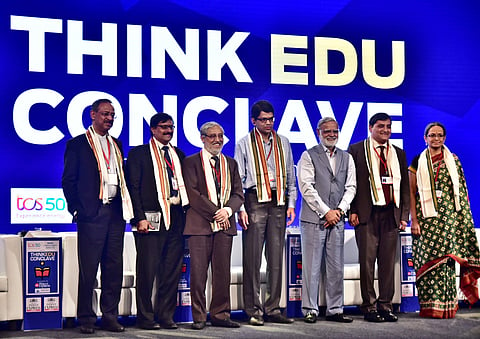

The country does not need an education policy as much as we need an action plan, said some of India's top minds in the area of education, speaking at panel discussion on 'What does India's new education policy really need?' at the ThinkEdu Conclave 2019 on Thursday.
"India has enough policies that exist in the books, but not in reality. What we need is a robust action plan that can be implemented in the immediate years to come," said Anil Swarup, former bureaucrat who has held multiple top positions with the central government. He said that the government should have a clear-cut strategy on what should be implemented, by when it should be implemented, who will implement it and how they will do it. He then threw open the discussion to the panelists, asking them to compare and contrast the need for a policy and action plan.
A good action plan for higher education will ensure equitable access to all those in the age group of 18-24, said R Subrahmanyam, the Higher Education Secretary, MHRD. "Only 27 per cent of people in that age group currently have access to higher education when the rate is 80 per cent in most developed countries," he said adding that very few youth in the central tribal belt of India have access to higher education. He further added that there is an urgent need to promote quality by bringing students to the same level through proper induction and exit programmes.
The stratification is a huge deterrent in the education system although pluralism and democracy is our biggest strength, said Padma Sarangapani, Chairperson, Centre for Education Innovation and Action Research, TISS. "We should not restrict the scope of our education to learning outcomes, it is only a part of the larger quality building in education," she said. A policy to integrate teachers' training with mainstream higher education is extremely crucial as teachers are are not trained to handle futuristic ideas the society expects students to be trained in, she said. "Most good universities ignore teacher training. The new Higher Education Council of India, should give exclusive importance to teacher training," she opined.
While we implement new policies, it equally important to celebrate the ones that have worked, said S Vaidhyasubramaniam, Vice-Chancellor, SASTRA Deemed-to-be University. "We need to celebrate local achievements, calibrate learning outcomes, and cerebrate informal education," he said.
Values such as sustainable development, sensitivity to society, dignity of labour and constant need for innovation should be integral to any education policy, said Anil D Sahasrabudhe, Chairperson, All India Council for Technical Education (AICTE). Education is massively stratified currently and these boundaries should come down, he said. "Education is not integral only to the youth, it's a life long process. That's what our education system should inculcate," he said.
J Krishna Kishore, CEO, Andhra Pradesh Economic Development Board, said that education policies should stop being abstract and work on including futuristic ides. "Internet of Things, Artificial Intelligence, robotics and augmented workforce should be a part of the curriculum itself," he said adding that vocational training should be given equal importance as mainstream education.
